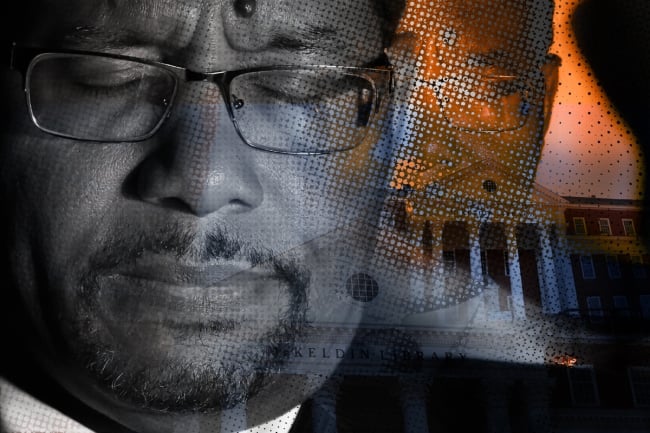You have /5 articles left.
Sign up for a free account or log in.

University of Maryland president Darryll Pines and a co-author have been accused of plagiarism in papers they published in 2002 and 2006. A review is underway.
Photo illustration by Justin Morrison/Inside Higher Ed | Shuke Li/iStock/Getty Images | Julia Nikhinson/The Washington Post/Getty Images
The University of Maryland at College Park will review the scholarship of President Darryll Pines—at his request—following allegations that he plagiarized portions of two papers.
Pines is alleged to have lifted 1,500 words from a tutorial website for a 5,000-word paper he co-authored in 2002, later reusing the same section in a 2006 paper, according to The Daily Wire, a conservative online publication that first made the allegations. Pines said that while the claims lack merit, an independent investigation is “in the best interest of the university.”
Pines, who has been president of Maryland’s flagship at College Park since 2020, is an aerospace engineer who previously led the university’s School of Engineering and has published dozens of articles.
The emerging controversy bears similarities to the scandal last year that ultimately toppled Harvard University president Claudine Gay, who made corrections to her scholarly work and eventually resigned following plagiarism allegations first reported by a conservative media outlet.
The Accusations
The Daily Wire listed more than a dozen examples of similar text in a side-by-side comparison of the tutorial website and the 2002 paper written by Pines and co-author Liming Salvino, who is now an executive in residence at Duke University. The Daily Wire—which was founded by conservative commentator Ben Shapiro and notes on its website that it “does not claim to be without bias”—alleged that Pines copied numerous passages from a 1996 tutorial written by Joshua Altmann, then a student in Australia, without referencing or citing his work.
Pines pushed back on the allegations Wednesday night.
“While I do not believe there is merit to these claims, an impartial review is in the best interest of the university,” he wrote in an email to faculty members, which the university shared. “Consistent with existing policies related to research conduct, I have asked the Office of Research Integrity (ORI) to begin an independent review.”
He said the findings would be shared with University System of Maryland chancellor Jay Perman.
Pines added that he “is steadfast that our results, data and findings are sound” but acknowledged “recurrent language in the introductory sections.” When the plagiarism allegations arose, he said, he “immediately connected” with his co-author “to review the manuscript.”
He also referenced rampant scrutiny aimed at higher education leaders.
“In the past year, like many of my fellow higher education presidents and chancellors, I have come under aggressive scrutiny, both personally and professionally, including aspersions cast on my decision-making and my values,” Pines noted in the message.
The Office of Research Integrity will complete the review within 60 days, in accordance with university policies.
Plagiarism Review
Lisa Rasmussen, a philosophy professor at the University of North Carolina at Charlotte and editor in chief of the journal Accountability in Research, noted that the allegations against Pines are complicated by the fact that he wrote the piece with a co-author. She said by email that the literature is full of cases “where one person plagiarized but the other knew nothing about it.”
Others argued that the number of authors makes little difference.
“It shouldn’t matter,” said Sam Bruton, a philosophy professor at the University of Southern Mississippi and former director of the institution’s Office of Research Integrity. “The fact that this person was one of the authors on a paper in which there are credible allegations of misconduct that have been made, then the University of Maryland is under an obligation to follow up and decide whether or not there should be an inquiry.”
While the consequences for Pines “may be lessened somewhat” if his co-author is found to have plagiarized, Bruton said, “It’s not entirely excusable” for Pines to have failed to catch the issue. He also suggested that if The Daily Wire’s reporting is accurate, “there is no doubt this is plagiarism.”
Rasmussen struck a similar stance.
“If it’s as reported, it is uncontroversial to acknowledge that that sample constitutes plagiarism,” she said.
Both Rasmussen and Bruton believe the allegations against Pines, who is Black, continue a pattern of attacks on scholars of color by conservative activists and publications in recent months. Black scholars in particular have been targeted by anonymous plagiarism complaints.
“It’s also uncontroversial to note that targeting particular groups of academics for plagiarism allegations is a stated goal of some political partisans,” Rasmussen said. “Even in cases where plagiarism allegations are true, that targeting seems at least as problematic as the plagiarism.”
Luke Rosiak, the Daily Wire reporter who wrote about the allegations, has covered four cases of alleged plagiarism this year. All four subjects accused of plagiarism are Black: Lisa Cook, a longtime academic and member of the Federal Reserve Board of Governors; Natalie Perry, a program lead at the University of California, Los Angeles, David Geffen School of Medicine; Democratic U.S. representative Jamaal Bowman of New York; and Pines.
In three of those cases, Rosiak partnered with anti–diversity, equity and inclusion activist Chris Rufo, who first published the allegations against Gay. While Rosiak was not involved with that case, he and Rufo have written about plagiarism allegations against Cook, Bowman and Pines.
Neither Rosiak nor Rufo responded to a request for comment from Inside Higher Ed. But Brent Scher, managing editor of The Daily Wire, wrote by email, “Our original reporting on Pines speaks for itself, and we stand by it.”




